小学英语语法-祈使句
- 格式:docx
- 大小:21.11 KB
- 文档页数:3
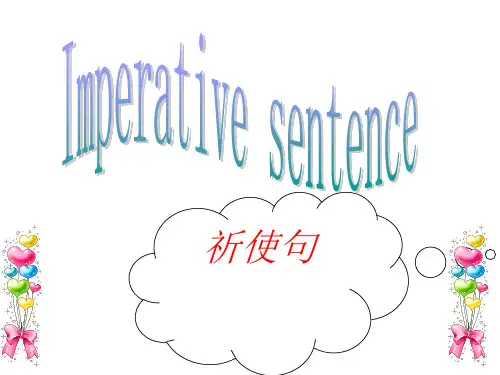
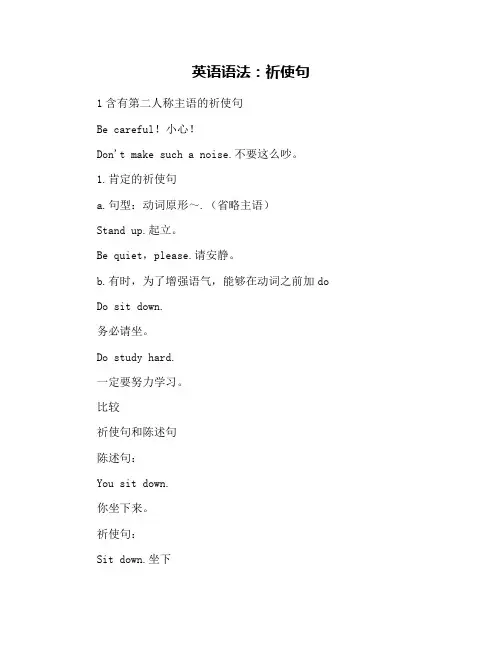
英语语法:祈使句1含有第二人称主语的祈使句Be careful!小心!Don't make such a noise.不要这么吵。
1.肯定的祈使句a.句型:动词原形~.(省略主语)Stand up.起立。
Be quiet,please.请安静。
b.有时,为了增强语气,能够在动词之前加do Do sit down.务必请坐。
Do study hard.一定要努力学习。
比较祈使句和陈述句陈述句:You sit down.你坐下来。
祈使句:Sit down.坐下(省略主语you)c.用客气的语气表示祈使句时,可在句首或句尾加上please,但如果在句尾加please,那在please之前一定要加一个逗号“,”。
Go this way,please.请这边走。
d.祈使句中如果有唤语,一定要用逗号“,”隔开,放在句首或句尾。
Li Ming,come here.李明,过来。
Come here,Li Ming.过来,李明。
2.否定的祈使句句型:Don't +动词原形~Don't swim in the river.别在河里游泳。
Don't be late.别迟到。
Please don't be noisy.请不要大声喧哗。
注意表示禁止时,尤其是标语等也可用“No+动名词”来表示。
No smoking.禁止吸烟。
No parking.禁止停车。
句型转换祈使句与陈述句的改写1.祈使句=You must …(陈述句)Come here .过来。
=You must come here .你必须过来。
Don't do that again.你一定不能够再那样做了。
2.Please +祈使句=Will you (please) ~?(陈述句)Please help me .请帮帮我。
=Will you (please) help me?你愿意帮我的忙吗?Come here on time ,please .请准时到这儿。
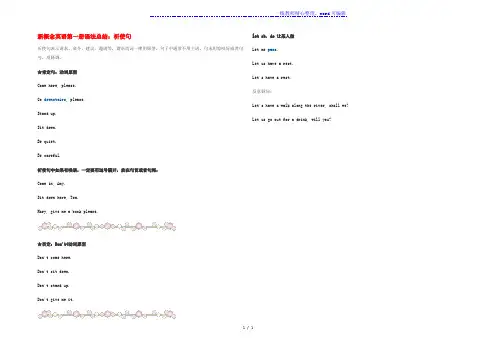
一线教师精心整理,word 可编辑
1 / 1 新概念英语第一册语法总结:祈使句
祈使句表示请求、命令、建议、邀请等,谓语动词一律用原型,句子中通常不用主语,句末用惊叹好或者句号,用降调。
★肯定句:动词原型
Come here, please.
Go downstairs , please.
Stand up.
Sit down.
Be quiet.
Be careful.
祈使句中如果有唤语,一定要用逗号隔开,放在句首或者句尾:
Come in, Amy.
Sit down here, Tom.
Mary, give me a book please.
★否定:Don't+动词原型
Don't come here.
Don't sit down.
Don't stand up.
Don't give me it.
let sb. do 让某人做 Let me pass . Let us have a rest. Let's have a rest. 反意疑问: Let's have a walk along the river, shall we? Let us go out for a drink, will you?。
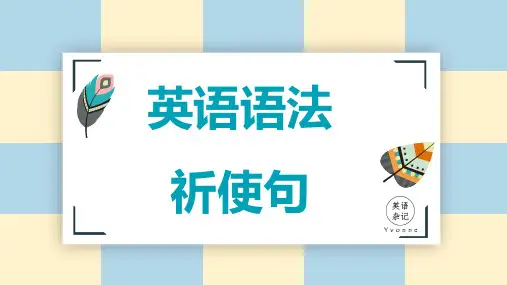

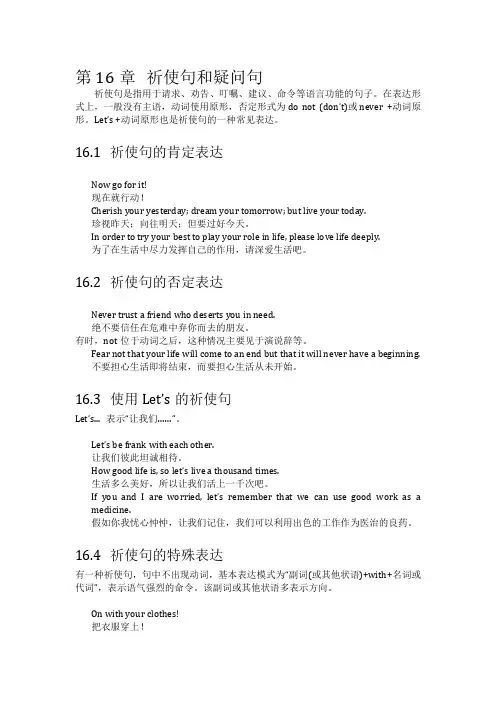
第16章祈使句和疑问句祈使句是指用于请求、劝告、叮嘱、建议、命令等语言功能的句子。
在表达形式上,一般没有主语,动词使用原形,否定形式为do not (don’t)或never +动词原形。
Let’s +动词原形也是祈使句的一种常见表达。
16.1 祈使句的肯定表达Now go for it!现在就行动!Cherish your yesterday; dream your tomorrow; but live your today.珍视昨天;向往明天;但要过好今天。
In order to try your best to play your role in life, please love life deeply.为了在生活中尽力发挥自己的作用,请深爱生活吧。
16.2 祈使句的否定表达Never trust a friend who deserts you in need.绝不要信任在危难中弃你而去的朋友。
有时,not位于动词之后,这种情况主要见于演说辞等。
Fear not that your life will come to an end but that it will never have a beginning.不要担心生活即将结束,而要担心生活从未开始。
16.3 使用Let’s的祈使句Let’s... 表示“让我们……”。
Let’s be frank with each other.让我们彼此坦诚相待。
How good life is, so let’s live a thousand times.生活多么美好,所以让我们活上一千次吧。
If you and I are worried, let’s remember that we can use good work as a medicine.假如你我忧心忡忡,让我们记住,我们可以利用出色的工作作为医治的良药。
16.4 祈使句的特殊表达有一种祈使句,句中不出现动词,基本表达模式为“副词(或其他状语)+with+名词或代词”,表示语气强烈的命令。
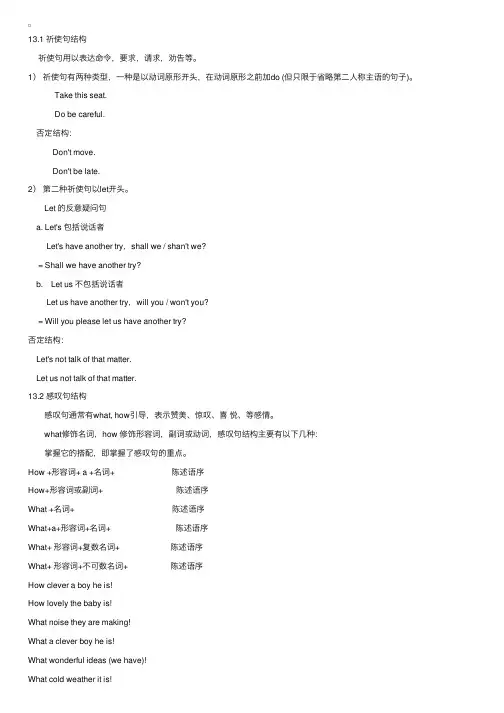
13.1 祈使句结构 祈使句⽤以表达命令,要求,请求,劝告等。
1)祈使句有两种类型,⼀种是以动词原形开头,在动词原形之前加do (但只限于省略第⼆⼈称主语的句⼦)。
Take this seat. Do be careful. 否定结构: Don't move. Don't be late.2)第⼆种祈使句以let开头。
Let 的反意疑问句 a. Let's 包括说话者 Let's have another try,shall we / shan't we? = Shall we have another try? b. Let us 不包括说话者 Let us have another try,will you / won't you? = Will you please let us have another try?否定结构: Let's not talk of that matter. Let us not talk of that matter.13.2 感叹句结构 感叹句通常有what, how引导,表⽰赞美、惊叹、喜悦、等感情。
what修饰名词,how 修饰形容词,副词或动词,感叹句结构主要有以下⼏种: 掌握它的搭配,即掌握了感叹句的重点。
How +形容词+ a +名词+ 陈述语序 How+形容词或副词+ 陈述语序What +名词+ 陈述语序What+a+形容词+名词+ 陈述语序What+ 形容词+复数名词+ 陈述语序What+ 形容词+不可数名词+ 陈述语序How clever a boy he is!How lovely the baby is!What noise they are making!What a clever boy he is!What wonderful ideas (we have)!What cold weather it is!感叹句的省略形式为:What a clever boy (he is)!典型例题1)___ food you've cooked!A. How a niceB. What a niceC. How niceD. What nice 答案D. 由于How 修饰形容词,副词;what修饰名词。
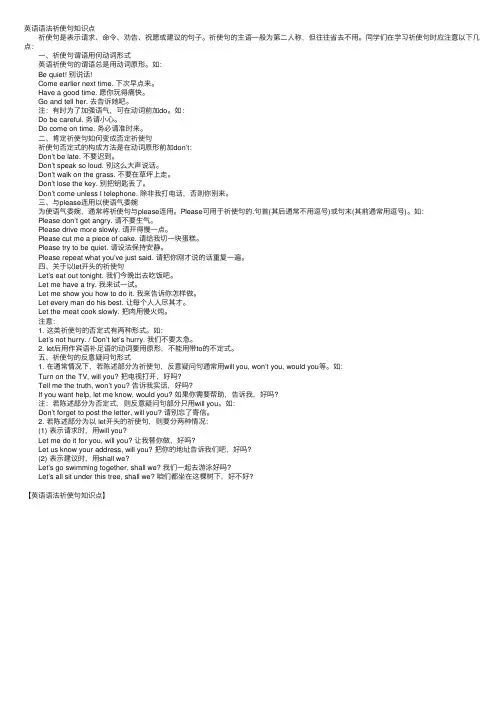
英语语法祈使句知识点 祈使句是表⽰请求、命令、劝告、祝愿或建议的句⼦。
祈使句的主语⼀般为第⼆⼈称,但往往省去不⽤。
同学们在学习祈使句时应注意以下⼏点: ⼀、祈使句谓语⽤何动词形式 英语祈使句的谓语总是⽤动词原形。
如: Be quiet! 别说话! Come earlier next time. 下次早点来。
Have a good time. 愿你玩得痛快。
Go and tell her. 去告诉她吧。
注:有时为了加强语⽓,可在动词前加do。
如: Do be careful. 务请⼩⼼。
Do come on time. 务必请准时来。
⼆、肯定祈使句如何变成否定祈使句 祈使句否定式的构成⽅法是在动词原形前加don’t: Don’t be late. 不要迟到。
Don’t speak so loud. 别这么⼤声说话。
Don’t walk on the grass. 不要在草坪上⾛。
Don’t lose the key. 别把钥匙丢了。
Don’t come unless I telephone. 除⾮我打电话,否则你别来。
三、与please连⽤以使语⽓委婉 为使语⽓委婉,通常将祈使句与please连⽤。
Please可⽤于祈使句的.句⾸(其后通常不⽤逗号)或句末(其前通常⽤逗号)。
如: Please don’t get angry. 请不要⽣⽓。
Please drive more slowly. 请开得慢⼀点。
Please cut me a piece of cake. 请给我切⼀块蛋糕。
Please try to be quiet. 请设法保持安静。
Please repeat what you’ve just said. 请把你刚才说的话重复⼀遍。
四、关于以let开头的祈使句 Let’s eat out tonight. 我们今晚出去吃饭吧。
Let me have a try. 我来试⼀试。

这篇关于2013小学四年级英语语法知识点辅导:祈使句结构,是特地为大家整理的,希望对大家有所帮助!
祈使句用以表达命令,要求,请求,劝告等。
1)祈使句有两种类型,一种是以动词原形开头,在动词原形之前加do (但只限于省略第二人称主语的句子)。
Take this seat.
Do be careful.
否定结构:
Don’t move.
Don’t be late.
2)第二种祈使句以let开头。
Let 的反意疑问句
a. Let’s 包括说话者
Let’s have another try,shall we / shan’t we?
= Shall we have another try?
b.Let us 不包括说话者
Let us have another try,will you / won’t you?
= Will you please let us have another try?
否定结构:
Let’s not talk of that matter.
Let us not talk of that matter.
1/ 1。

祈使句讲解一、祈使句:用于表达命令、请求、劝告、警告、禁止等的句子叫做祈使句. 祈使句的作用是要求、请求或命令、劝告、建议他人做或不做一件事。
祈使句的句末一般用感叹号,可是有些祈使句的语气较弱,可以用句号结尾祈使句因对象(即主语)是第二人称,所以通常都省略。
祈使句的动词都为一般此刻时,例:Go and wash your hands. 例如:维持肃静!Be kind to our sister. Watch your steps. 表示禁止的句式有:不准、不要、别、No parking.二、表现形式●肯定结构:1. Do型(即:动词原形(+宾语)+其它成份)。
如:Please have a seat here.有的祈使句在意思明确的情况下,动词可省略。
如:This way, please. = Go this way, please. 。
2. Be型(即:Be + 表语(名词或形容词)+其它成份)。
如:Be a good boy! 要做一个好孩子!3. Let型(即:Let + 宾语+ 动词原形+ 其它成份)。
如:Let me help you. 让我来帮你。
●否定结构:1.Do型和Be型的否定式都是在句首加don\'t组成,如:Don\'t forget me!Don\'t be late for school!2.Let型的否定式有两种:“Don\'t + let + 宾语+ 动词原形+ 其它成份”和“Let + 宾语+ not+ 动词原形+ 其它成份”。
如:Don\'t let him go. / Let him not go. 别让他走。
3.有些可用no开头,用来表示禁止性的祈使句。
如:No smoking! No fishing! 禁止钓鱼!三、祁使句类型祁使句是用来向他人提出命令,建议或请求的句式.常见的祁使句有以下五种:1) Let's 开头的祁使句如: Let's say it in English .2) 动词原形开头的祁使句. 如: Listen to the teacher .3) Shall I 开头的祁使句 . 如: Shall I carry the parcel for you ?4) Will you 开头的祁使句. 如: Will you come here early ?5) 以Please 开头的祁使句如: Please take a message for him.6)带呼语的祈使句,如:Mary, come down here ! (对mary 发言,而不带呼语的且以动词原形开头的祈使句则对第二人称发言)7)不让对方做某事, 英语用" Don't " . 例如:Don't speak loud . 不要高声发言. Don't write in that way . 不要那样写."let"带头的祈使句是个常见的动文句型,它的主要用法有下列三种:1.表示“建议”。

英语语法祈使句知识点英语语法祈使句知识点祈使句是表示请求、命令、劝告、祝愿或建议的句子。
祈使句的主语一般为第二人称,但往往省去不用。
同学们在学习祈使句时应注意以下几点:一、祈使句谓语用何动词形式英语祈使句的谓语总是用动词原形。
如:Be quiet! 别说话!Come earlier next time. 下次早点来。
Have a good time. 愿你玩得痛快。
Go and tell her. 去告诉她吧。
注:有时为了加强语气,可在动词前加do。
如:Do be careful. 务请小心。
Do come on time. 务必请准时来。
二、肯定祈使句如何变成否定祈使句祈使句否定式的构成方法是在动词原形前加don’t:Don’t be late. 不要迟到。
Don’t speak so loud. 别这么大声说话。
Don’t walk on the grass. 不要在草坪上走。
Don’t lose the key. 别把钥匙丢了。
Don’t come unless I telephone. 除非我打电话,否则你别来。
三、与please连用以使语气委婉为使语气委婉,通常将祈使句与please连用。
Please可用于祈使句的.句首(其后通常不用逗号)或句末(其前通常用逗号)。
如:Please don’t get angry. 请不要生气。
Please drive more slowly. 请开得慢一点。
Please cut me a piece of cake. 请给我切一块蛋糕。
Please try to be quiet. 请设法保持安静。
Please repeat what you’ve just said. 请把你刚才说的话重复一遍。
四、关于以let开头的祈使句Let’s eat out tonight. 我们今晚出去吃饭吧。
Let me have a try. 我来试一试。
Let me show you how to do it. 我来告诉你怎样做。
英语语法——祈使句①知识点:一、祈使句:用来表示下达命令、提出要求、建议和劝告的句子。
说话的对象通常是第二人称you ,习惯上常省略。
祈使句的肯定句谓语动词用原形,否定句一般用don’t, never开始。
1.肯定祈使句句型1 :动词let+ 第一、三人称宾格代词+ V.例句:Let’s go to school. 让我们去上学吧。
Let me try.让我试一试。
Let him come upstairs. 让他上楼吧。
句型2:动词+ 其他部分例句:Please open the door . 请开门。
Turn to page two. 请将书翻到第二页。
Listen to me. 请听我讲。
Stop talking. 别说话。
二、否定祈使句(一般在句首加Don’t.)1.Climbthetree ,please. 请爬树。
(肯定句)Don’t climb the tree! 不要爬树。
(否定句)2.Open the door. 打开门。
(肯定句)Don’t open the door.不要开门。
(否定句)三、陈述句变祈使句1.Youcan’t make facesin class. 你不能在课堂上做鬼脸。
Don’tmakefaces in class. 不要在课堂上做鬼脸。
2.You can’t read inbed.你不要在床上看书。
Don’t read in bed. 不要在床上看书。
祈使句的用法及练习(一)Be型 (be+adj)Be careful!Bedangerous! Be quiet!(二)Do型 (Do代表动词原形)Open the door! Close the window! Go and play football! (三)Let's或Let us型Let's go home! Let us help Mary! Let meclean the room!(四)No+动名词,多用在标语禁令中No smoking! No parking! No spitting!No+动名词可以与Don't+动词原形替换。
英语语法祈使句知识点英语语法祈使句学问点51. 祈使句的概念表示恳求、命令、建议、祝福、邀请或要求的句子叫祈使句。
用于祈使句句首的动词总是用原形,不能用其他形式。
如:Shut the door!把门关上!Have a cup of coffee!喝杯咖啡吧!Let them go by train. 叫他们坐火车去吧。
祈使句的主语通常为其次人称(you),但一般都被省略,只有在特别的状况下才把主语(you)补充出来。
如:You be quiet!你宁静!You go and tell him, Chris. 克立斯,你去告知他。
You wait here for a moment. 你在这儿等一会儿。
有时祈使句的主语也可以是everybody, somebody, anybody,nobody等不定代词。
如:Stand up, everybody!全体起立!Nobody move. 任何人都不许动。
2. 祈使句表示强调为了加强祈使句的语气,我们通常是在祈使句的动词原形前加上助动词do,此时通常译为肯定务必等。
如:Do be careful. 务必要当心。
Do have some more tea. 肯定再喝点茶。
Do let me go. 肯定让我去。
副词never和always有时可用于祈使句句首,表示强调。
如:Never do that again. 再不要这样做了。
Always look in the mirror before starting to drive. 肯定要先看看反光镜再开车。
3. 祈使句的否认式构成祈使句否认式的方法很简洁,那就是在动词原形前加don’t——不管祈使句所用的动词为什么性质动词,状况都是一样。
如:Open the window. 把窗户翻开。
→Don’t open the window. 别把窗户翻开。
Come next Monday. 下周星期一来。
→Don’t come next Monday. 下周星期一别来。
小升初寒假专题-------- 感叹句/祈使句知识点梳理感叹句what / how的使用1. what的使用,what用于修饰名词或者名词词组;做题时找准感叹句中的主语,再看主语前面的单词的词性;Eg: What good news we heard! We heard是这句话的主语和谓语动词,而we前面的单词news是名词,所以用what.What的类型:what + a / an +adj. +名词单数+ 主语+ 谓语+ 其他!what + adj. +名词复数+ 主语+ 谓语+ 其他!what +adj. +不可数名词+ 主语+ 谓语+ 其他!2.how的使用,how用于修饰副词或者修容词,做题时,方法同上。
Eg: How good the news was! 这句中的主语是the news, 而主语前面是good, good是形容词, 所以用how.How的类型:How + adj./ adv + 主语+ 谓语+ 其他!注意: 1. 感叹句what / how的本质作用,只是起到增强语气的作用,在句子中不会充当任何的成分。
做完题目后,可以去掉what/how。
来还原句子,检测答案对不对。
2. 感叹句what一词,一定要考虑名词的单复数问题以及名词的不可数性问题。
3. 若在词汇的正确形式中遇到感叹句,切记去感叹词what; how;然后将句子还原来做题。
祈使句的使用祈使句分类:肯定祈使句----- A. 行为动词原形+ 其他B. Be 动词+ 其他否定祈使句----- A. Don’t 行为动词原形+ 其他B. Don’t be 动词+ 其他C. No + ving特殊祈使句:Let sb. do sth. / Let sb. not do sth.祈使句的回答:用will或者won’t来回答。
如果句子是肯定,就用will; 如果是否定,就用wo n’t.Eg:---- Don’t drive so quickly, Bobby. ---- Ok, I won’t.祈使句的反义疑问句:Let’s的反义疑问句,shall we?其余的祈使句的反义疑问句,will you?注意: 1. No + 名词,名词一般是复数2. 祈使句和反身代词的内容放在一起时,注意反身代词的单复数问题。
英语语法“祈使句”的重点句型祈使句是表示请求、命令、劝告、祝愿或建议的句子。
祈使句的主语一般为第二人称,但往往省去不用。
同学们在学习祈使句时应注意以下几点:一、祈使句谓语用何动词形式:英语祈使句的谓语总是用动词原形。
如:Be quiet! 别说话!Come earlier next time. 下次早点来。
Have a good time. 愿你玩得痛快。
Go and tell her. 去告诉她吧。
注:有时为了加强语气,可在动词前加do。
如:Do be careful. 务请小心。
Do come on time. 务必请准时来。
二、肯定祈使句如何变成否定祈使句:祈使句否定式的构成方法是在动词原形前加don’t:Don’t be late. 不要迟到。
Don’t speak so loud. 别这么大声说话。
Don’t walk on the grass. 不要在草坪上走。
Don’t lose the key. 别把钥匙丢了。
Don’t come unless I telephone. 除非我打电话,否则你别来。
三、与please连用以使语气委婉:为使语气委婉,通常将祈使句与please连用。
Please可用于祈使句的句首(其后通常不用逗号)或句末(其前通常用逗号)。
如:Please don’t get angry. 请不要生气。
Please drive more slowly. 请开得慢一点。
Please cut me a piece of cake. 请给我切一块蛋糕。
Please try to be quiet. 请设法保持安静。
Please repeat what you’ve just said. 请把你刚才说的话重复一遍。
四、关于以let开头的祈使句:Let’s eat out tonight. 我们今晚出去吃饭吧。
Let me have a try. 我来试一试。
Let me show you how to do it. 我来告诉你怎样做。
英语语法——祈使句①知识点:一、祈使句:用来表示下达命令、提出要求、建议和劝告的句子。
说话的对象通常是第二人称you ,习惯上常省略。
祈使句的肯定句谓语动词用原形,否定句一般用don’t, never开始。
1.肯定祈使句句型1 :动词let + 第一、三人称宾格代词+ V.例句:Let’s go to school. 让我们去上学吧。
Let me try. 让我试一试。
Let him come upstairs. 让他上楼吧。
句型2:动词+ 其他部分例句:Please open the door . 请开门。
Turn to page two. 请将书翻到第二页。
Listen to me. 请听我讲。
Stop talking. 别说话。
二、否定祈使句(一般在句首加Don’t.)1.Climb the tree ,please. 请爬树。
(肯定句)Don’t climb the tree! 不要爬树。
(否定句)2.Open the door. 打开门。
(肯定句)Don’t open the door. 不要开门。
(否定句)三、陈述句变祈使句1.You can’t make faces in class. 你不能在课堂上做鬼脸。
Don’t make faces in class. 不要在课堂上做鬼脸。
2.You can’t read in bed. 你不要在床上看书。
Don’t read in bed. 不要在床上看书。
祈使句的用法及练习(一)Be型 (be+adj)Be careful! Be dangerous! Be quiet!(二)Do型 (Do代表动词原形)Open the door! Close the window! Go and play football! (三)Let's或Let us型Let's go home! Let us help Mary! Let me clean the room! (四)No+动名词,多用在标语禁令中No smoking! No parking! No spitting!No+动名词可以与Don't+动词原形替换。
1祈使句(Imperative Sentence)
1.1 定义
用于表达意愿、命令、请求、劝告、警告、禁止等的句子叫做祈使句,祈使句最常用于表达命令,因此在学校文法中也常称为命令句。
祈使句因对象(即主语)是第二人称,所以通常都省略。
祈使句的动词都为一般现在时,句末则使用句号或感叹号来表示结束,读时用降调。
例:
Go and wash your hands. (去洗你的手。
——命令)
Be quiet, please.(Please be quiet.)(请安静。
——请求)
Be kind to our sister. (对姊妹要和善。
——劝告)
Watch your steps. (走路小心。
——警告)
Look out!Danger!(小心!危险!——强烈警告)
Keep off the grass. (勿践草坪。
——禁止)
No parking. (禁止停车。
——禁止)
No eating or drinking. (禁止吃喝。
——禁止)
No littering. (禁止乱扔垃圾。
——禁止)
祈使句也常把主语“You”表达出来,使对方听起来觉得柔和些,例如:
You go and tell him, Chris. (克立斯去告诉他。
)
1.2 概念口诀
祈使句无主语,主语you常省去;
动词原形谓语当,句首加don't变否定;
朗读应当用降调,句末常标感叹号。
1.3 表现形式
1.3.1肯定句
1.Do型(即:动词原形(+宾语)+其它成分)。
如:Please have a seat here. 请这边坐。
有的祈使句在意思明确的情况下,动词可省略。
如:This way, please. = Go this way, please. 请这边走。
2.Be型(即:Be + 表语(名词或形容词)+其它成分)。
如:Be a good boy! 要做一个好孩子!
3.Let型(即:Let + 宾语+ 动词原形+ 其它成分)。
如:Let me help you. 让我来帮你。
1.3.2否定句
1.Do型和Be型的否定式都是在句首加don't构成:如:Don't forget me! 不要忘记我!
Don't be late for school! 上学不要迟到!
是系表结构——也就是没有行为动词但是有形容词的那种——使用Don't be
有行为动词的就不能这么用,只能用Don't
2.Let型的否定式有两种:“Don't + let +宾语+ 动词原形+ 其它成分”和“Let + 宾语+ not + 动词原形+ 其它成分”。
如:Don't let him go. / Let him not go. 别让他走。
3.有些可用no开头,用来表示禁止性的祈使句。
如:No smoking! 禁止吸烟!No fishing! 禁止钓鱼!
1.4 练习
将下列汉语翻译成英语。
1. 请照看好您的包。
___________________.
2. 让我们去学校吧!___________________!
3. 亲爱的,高兴点儿!___________________!
4. 不要把书放这儿。
___________________.
5. 不要让猫进来。
___________________.
6. 禁止吸烟。
____________!
Key:
1.Please look after your bag.
2.Let's go to school.
3.Be glad, dear
4.Don't put the book here .
5.Don't let the cat come in / Let the cat not come in . 6.No smoking!。